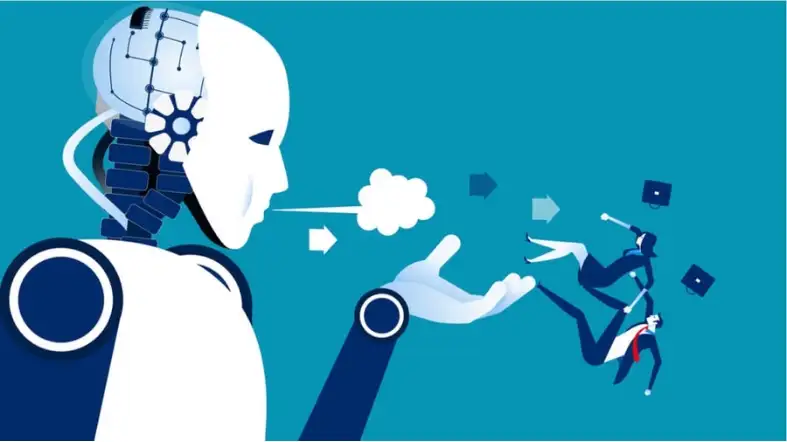Sales are constantly changing, and many wonders if AI will replace salespeople. AI has advanced in recent years, but can it replace human salespeople?
In this blog post, we’ll answer the question, “Will AI Replace Salespeople?”.
Also, explore How AI Lead to reduce sales jobs, What abilities do salespeople have to gain to stay relevant with AI? Finally, we’ll explore the pros and cons of AI in sales.

Will AI Replace Salespeople?
No, AI is unlikely to replace salespeople entirely. While it can assist and enhance their work, salespeople who leverage technology to their advantage will still be crucial in understanding customers’ diverse needs and wants in the B2B arena.
Companies selling AI technologies may even create larger sales forces to capture complex opportunities.
How Will AI Technology Lead To A Reduction In Sales Jobs?
Automation of Routine Tasks
One of the primary ways AI is impacting sales jobs is through the automation of routine tasks. AI-powered systems can now handle repetitive and time-consuming activities that were traditionally performed by sales representatives.
For example, AI chatbots can engage with potential customers, answer frequently asked questions, and even recommend products or services based on user preferences.
By automating these tasks, companies can reduce their reliance on human sales agents, leading to a decline in sales job opportunities.
Data-Driven Sales Insights
AI technology excels at analyzing vast amounts of data quickly and accurately.
This ability enables businesses to gain valuable insights into customer behavior, preferences, and buying patterns.
With AI-powered analytics tools, companies can identify trends, segment their customer base, and personalize sales approaches.
As a result, sales representatives may no longer be needed to manually gather and analyze data, as AI can perform these tasks more efficiently.
This trend reduces the demand for sales professionals who specialize in data analysis and reporting.
Predictive Sales Analytics
Another sign of AI’s impact on sales jobs is the emergence of predictive sales analytics.
By utilizing historical data and machine learning algorithms, AI systems can forecast customer demand, identify potential leads, and predict sales outcomes with a high degree of accuracy.
This predictive capability empowers businesses to optimize their sales strategies and allocate resources effectively.
However, it also means that sales roles focused on forecasting and strategic planning may become less relevant in the future.
Virtual Sales Assistants
Virtual sales assistants powered by AI are becoming increasingly prevalent in the sales industry.
These intelligent assistants can support sales teams by handling administrative tasks, scheduling meetings, and providing real-time information during sales calls.
They can also analyze customer interactions and provide sales representatives with valuable suggestions and recommendations.
With the assistance of virtual sales assistants, sales professionals can streamline their workflows and improve their productivity.
However, this also means that companies may require fewer sales representatives to achieve the same level of efficiency.
E-commerce and Self-Service
The growth of e-commerce and self-service technologies is another significant factor contributing to a reduction in sales jobs.
Consumers now have access to online platforms where they can research products, compare prices, and make purchases without the need for direct interaction with sales representatives.
AI-powered recommendation systems further enhance the self-service experience by offering personalized product suggestions.
As more customers shift towards these digital channels, the demand for traditional sales roles diminishes, leading to a decline in sales job opportunities.
Adapting to the Changing Landscape
While the signs point towards a reduction in sales jobs due to AI technology, it’s important to recognize that new opportunities will also arise.
As the sales landscape evolves, it becomes crucial for sales professionals to adapt and acquire new skills that complement AI technology.
By embracing AI and focusing on areas where human expertise is irreplaceable, such as building relationships, understanding complex customer needs, and providing exceptional service, sales professionals can position themselves for success in the changing sales environment.
Essential Skills And Abilities Salespeople Should Develop To Stay Competitive With AI

Embrace AI as a tool, not a threat.
Artificial intelligence is changing the way we work, and salespeople are no exception.
Instead of fearing AI, salespeople should learn to embrace it as a tool to enhance their productivity and effectiveness.
AI can help salespeople automate repetitive tasks, analyze data, and make more informed decisions.
By embracing AI, salespeople can stay competitive and stay ahead of the curve.
Develop strong communication skills.
While AI can help with data analysis and decision-making, it cannot replace the human touch when it comes to communication.
Salespeople need to develop strong communication skills to build relationships with their clients, understand their needs and preferences, and provide personalized solutions.
Effective communication skills include active listening, empathy, clear and concise messaging, and the ability to adapt to different communication styles.
Focus on relationship building.
Relationship building is a key aspect of sales, and it requires a human touch that AI cannot replicate.
Salespeople need to focus on building strong relationships with their clients, understanding their needs, and providing personalized solutions.
By building relationships, salespeople can establish trust, loyalty, and long-term partnerships that are difficult to replicate with AI.
Develop a deep understanding of the industry and market.
AI can provide valuable insights into market trends and customer behavior, but it requires human input to interpret and apply these insights.
Salespeople need to develop a deep understanding of the industry and market they operate in to identify opportunities, anticipate changes, and make informed decisions.
This requires staying up to date with industry news, attending conferences, and conducting market research.
Stay up to date with technology.
As AI continues to evolve, salespeople need to stay up to date with the latest technology and tools available to them.
This includes learning how to use AI-powered sales software, leveraging social media and digital marketing, and staying up to date with emerging technologies.
By staying up to date with technology, salespeople can enhance their productivity, effectiveness, and competitiveness.
Develop a growth mindset.
Finally, salespeople need to develop a growth mindset to stay competitive with AI. This means being open to learning, adapting, and embracing change.
AI is rapidly changing the sales landscape, and salespeople need to be willing to adapt and learn new skills to stay ahead of the curve.
By developing a growth mindset, salespeople can stay competitive, evolve, and thrive in a rapidly changing environment.
The Advantages Of Using AI In Sales.

AI-Powered Lead Generation
AI algorithms can analyze vast amounts of data to identify potential leads and prospects.
By leveraging AI for lead generation, businesses can save time and resources while targeting the right audience.
AI can process customer information, social media data, and online behavior to identify individuals who are more likely to convert into customers.
For example, AI-powered lead generation tools can analyze website traffic and engagement metrics to prioritize leads with higher chances of conversion, enabling sales teams to focus their efforts efficiently.
Personalized Customer Interactions
One of the key advantages of using AI in sales is the ability to deliver personalized customer experiences at scale.
AI-powered chatbots and virtual assistants can engage with customers in real time, providing immediate support and answers to their queries.
These AI assistants can learn from customer interactions and improve over time, ensuring consistent and accurate responses.
By personalizing customer interactions, businesses can enhance customer satisfaction, build trust, and ultimately increase sales.
Sales Forecasting and Predictive Analytics
AI can analyze historical data, market trends, and customer behavior to generate accurate sales forecasts and predictions.
By leveraging predictive analytics, businesses can anticipate customer needs, identify market opportunities, and optimize their sales strategies.
For example, AI algorithms can analyze past sales data, seasonality patterns, and external factors like economic indicators to forecast future sales volumes.
This helps businesses allocate resources effectively, identify potential bottlenecks, and make informed decisions to drive sales growth.
Process Automation and Efficiency
AI technology can automate repetitive and time-consuming sales tasks, allowing sales teams to focus on higher-value activities.
AI-powered tools can automate data entry, lead qualification, email outreach, and follow-ups, freeing up valuable time for sales representatives to engage with customers and close deals.
This automation not only increases productivity but also reduces the risk of human error, ensuring consistency and accuracy in sales processes.
Sales Performance Insights
AI can provide valuable insights into sales performance by analyzing vast amounts of data.
Sales managers can gain visibility into sales pipelines, identify key performance indicators (KPIs), and track individual and team performance.
AI-powered analytics dashboards can highlight areas of improvement, identify trends, and provide actionable recommendations to optimize sales strategies.
With AI-driven insights, businesses can make data-driven decisions, measure the effectiveness of sales initiatives, and continuously improve their sales performance.
Enhanced Sales Training and Onboarding
AI technology can be used to enhance sales training and onboarding processes.
By analyzing successful sales interactions and customer data, AI algorithms can identify the best practices and techniques that lead to successful outcomes.
These insights can be used to train new sales representatives, providing them with real-world examples and guidance to improve their performance.
AI can also simulate sales scenarios, allowing sales teams to practice and refine their skills in a risk-free environment.
The Disadvantages Of Using AI In Sales.

Lack of Personalization
One of the main disadvantages of using AI in sales is the lack of personalization. AI algorithms are designed to analyze data and make predictions based on patterns.
While this can be useful for identifying trends and making recommendations, it doesn’t account for individual preferences and behavior.
For example, AI might recommend a product to a customer based on their browsing history or purchase behavior.
However, it may not take into account that the customer recently bought a similar product or has a specific need that isn’t being met by the recommendation.
Limited Creativity
Another disadvantage of using AI in sales is the limited creativity. AI algorithms are designed to work within certain parameters and make decisions based on data.
While this can be useful for automating routine tasks, it can also limit the creativity of sales professionals.
For example, an AI algorithm might recommend a certain sales pitch or product based on data, but it may not be able to come up with new ideas or approaches that haven’t been tried before.
This can limit the ability of sales professionals to innovate and find new ways to reach customers.
Lack of Emotional Intelligence
Emotional intelligence is a key skill for sales professionals. It involves the ability to understand and respond to the emotions of others, build relationships, and communicate effectively.
While AI can analyze data and make predictions, it can’t replicate the emotional intelligence of a human sales professional.
For example, an AI chatbot might be able to answer basic customer questions, but it may not be able to pick up on subtle emotional cues or respond to complex emotional situations.
This can lead to frustration or misunderstanding for customers who are looking for a more personal touch.
Cost and Implementation Challenges
Implementing AI technology in sales can be costly and challenging. It requires significant investment in technology, training, and infrastructure.
Additionally, integrating AI into existing sales processes can be complex and time-consuming.
For example, implementing an AI-powered CRM system may require significant customization and integration with existing systems.
This can be a major undertaking for small or medium-sized businesses with limited resources.
Dependence on Data Quality
AI algorithms rely on data to make predictions and recommendations. However, if the data is incomplete or inaccurate, the algorithm may produce flawed results.
This can lead to poor decision-making and missed opportunities for sales professionals.
For example, if customer data is outdated or incomplete, AI algorithms may make recommendations based on inaccurate information.
This can lead to wasted time and resources, as sales professionals pursue leads that are unlikely to convert.
FAQs
What Tasks Can AI Assist Salespeople With?
AI can assist salespeople in various ways, such as automating administrative tasks, providing sales intelligence, and improving lead management.
AI-powered CRM tools and chatbots embedded in websites have become valuable tools for sales representatives, enhancing their productivity and efficiency.
How Does AI Enhance The Sales Process?
AI enhances the sales process by streamlining lead qualification, providing predictive analytics for identifying potential customers, and optimizing sales strategies based on data-driven insights.
AI-enabled CRM systems and sales intelligence tools empower sales teams to make more informed decisions.
Will The Role Of Salespeople Evolve With The Rise Of AI?
Yes, the role of salespeople is evolving with the rise of AI.
As AI technology automates repetitive tasks and data analysis, salespeople can shift their focus to more strategic activities, such as building relationships, creating personalized solutions, and collaborating with other departments like marketing.
Conclusion
Despite recent advances in AI, it is unlikely to replace human salespeople. AI can automate lead qualification and data analysis, but sales still require a human touch.
Human salespeople excel at building relationships, understanding complex consumer demands, and providing customized solutions.
Thus, AI will remain crucial to sales but won’t replace salespeople. Instead, the most successful sales teams will blend human and computer strengths to create a more effective and efficient sales process.




